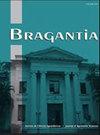Combining ability of tomato inbred lines to bacterial wilt resistance
IF 1.5
4区 农林科学
Q2 AGRICULTURE, MULTIDISCIPLINARY
引用次数: 1
Abstract
: Tomato is one of the most important crops worldwide. Bacterial wilt (BW), caused by Ralstonia spp. , is a major disease for tomato production around the world, especially in tropical and subtropical regions. Currently in Brazil, only commercial hybrids are available as resistant rootstocks for use in infested areas, and we lack information regarding resistance to aggressive strains. Thus, the aims of this work were to estimate combining abilities of five tomato inbred lines and hybrids and to identify resistant genotypes for using as rootstocks resistant to Ralstonia solanacearum biovar 2, phylotype II, one of the most aggressive strains in Brazil. Combining abilities for BW resistance were assessed through full diallel crossings among five tomato inbred lines without reciprocals. The experiment was carried out in a greenhouse, in a complete randomized blocks design, using 15 genotypes (hybrids and parents). Additive genetic effects showed to be the most important for controlling bacterial wilt. The inbred line Hawaii 7996 exhibited the highest general combining ability among the five parents assessed. The hybrid Hawaii 7996 × Rodade was the best crossing in terms of resistance and specific combining ability, which was greater than those of all other hybrids. Although Hawaii 7996 remains as a major source for BW resistance, further researches are needed to better understand the resistance dynamics, seeking to develop hybrids with transgressive segregations and more stable resistance against aggressive strains and thrive under environmental conditions highly favorable to bacterial wilt infection.番茄自交系抗青枯病配合力研究
西红柿是世界上最重要的作物之一。青枯病(Bacterial wilt, BW)是一种由Ralstonia spp.引起的番茄病害,是全球番茄生产的主要病害,特别是在热带和亚热带地区。目前在巴西,只有商业杂交品种可作为抗侵染地区的砧木,我们缺乏关于抗侵染菌株的信息。因此,本研究的目的是估计5个番茄自交系和杂交种的配合力,并确定抗病基因型,以便作为砧木抵抗巴西最具侵略性的菌株之一——番茄枯萎病2号生物变种II型。采用无互交的5个番茄自交系进行全双列杂交,评价了抗BW的配合力。试验在温室中进行,采用完全随机区组设计,使用15种基因型(杂交和亲本)。加性遗传效应对青枯病的防治具有重要作用。自交系夏威夷7996在5个亲本中一般配合力最高。杂种夏威夷7996 × Rodade在抗逆性和特异配合力方面表现最好,优于其他所有杂种。虽然夏威夷7996仍然是BW抗性的主要来源,但需要进一步的研究来更好地了解抗性动态,寻求开发具有入侵分离和更稳定的抗性的杂交品种,并在高度有利于细菌性枯萎病感染的环境条件下茁壮成长。
本文章由计算机程序翻译,如有差异,请以英文原文为准。
求助全文
约1分钟内获得全文
求助全文
来源期刊

Bragantia
AGRICULTURE, MULTIDISCIPLINARY-
CiteScore
2.40
自引率
8.30%
发文量
33
审稿时长
4 weeks
期刊介绍:
Bragantia é uma revista de ciências agronômicas editada pelo Instituto Agronômico da Agência Paulista de Tecnologia dos Agronegócios, da Secretaria de Agricultura e Abastecimento do Estado de São Paulo, com o objetivo de publicar trabalhos científicos originais que contribuam para o desenvolvimento das ciências agronômicas.
A revista é publicada desde 1941, tornando-se semestral em 1984, quadrimestral em 2001 e trimestral em 2005.
É filiada à Associação Brasileira de Editores Científicos (ABEC).
 求助内容:
求助内容: 应助结果提醒方式:
应助结果提醒方式:


